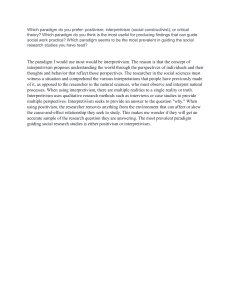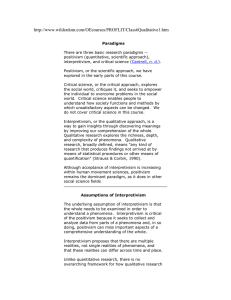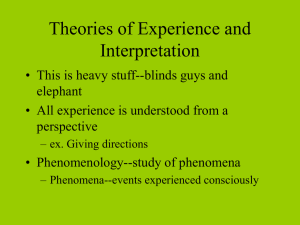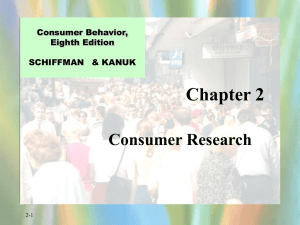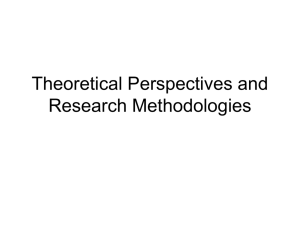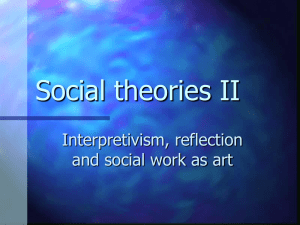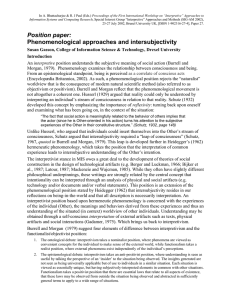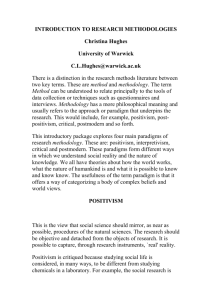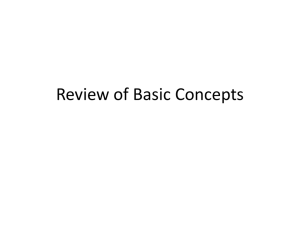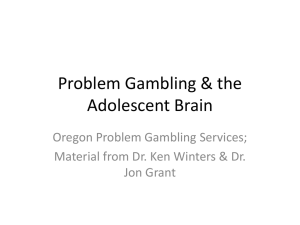Interpretativism - Researcher Education Programme
advertisement
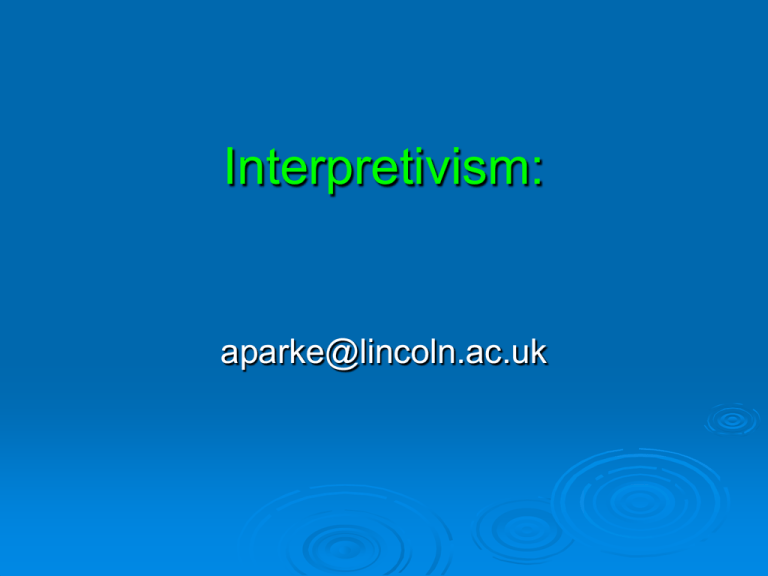
Interpretivism: aparke@lincoln.ac.uk The research problem Impact of Information Technology on gambling behaviour Under-researched phenomena (minimal knowledge of hypotheses or even core variables) Through explorative studies build a substantive understanding of phenomena Grounded Theory produced theoretical framework to shape investigation Empirical Testing of Hypotheses The research problem Observed: 1. Pariticipants have increased gambling participation since availability of online gambling Participants believed through manipulation of IT processes that profitable control in gambling was possible Participants stated the primary objective of online gambling was profit accumulation Significant proportion of online gamblers actively attempted to achieve profitable control via IT Profit accumulated was positively correlated with engagement in IT processes (multiple samples) 2. 3. 4. 5. The research problem Theoretical Limitations: Dots appeared to connect (at face value at least) Do the participants make the same connection (i.e. is gambling an economically motivated activity) The theory lacked depth (using outcome to explain behaviour) Wanted to know: How has their understanding of gambling changed in response to these changes? Needed an epistemology that could provide such ‘knowledge’ Interpretivism Not a specific epistemology, rather a loose category In general, takes a position that is non-positivist (not necessarily anti-positivist) Difference in subject matter is profound Natural Reality versus Social Reality Emphasis is on Empathic Understanding rather than External Explanation Interpretivism ‘The world of nature as explored by the natural scientist does not mean anything to the molecules, atoms and electrons. But the field of the social scientist – Social Reality – has a specific meaning and relevance for the beings living, acting and thinking within it.’ (Schutz, 1962) Interpreted Social Reality What is a good community to you? Verstehen Sociology Philosopher Max Weber (preceding modern social science) Antipositivist approach to social action (sociological positivism & economic determinism are limited) Against the emphasis of ‘impersonal’ external factors explaining action Verstehen – systematic process of outsider observing a culture, attempting to ‘relate’ Criticism – Can an outsider ever ‘understand’ another participant/culture? Epistemologies of Interpretivism Symbolic Interactionism – Understanding social behaviour by focusing on practices Interaction with reality is MEDIATED by the process of ‘making sense’ - performed through social interaction We then act on such interpretations ‘Meaning’ is not static but changed iteratively through experience Meaning of ‘father’ changes with experience, and this change affects action Epistemologies of Interpretivism Phenomenology Understanding ‘social reality’ must be grounded in people’s experiences of that reality Prevailing understanding/knowledge must be forgotten, and the phenomena experienced ‘anew’ (bracketing off) Accessing subjective experience: exploration of personal experience to understand reality External logic vs Internal logic of participant (not group level but individual logic) Epistemologies of Interpretivism Hermeneutics Social reality is socially constructed and not routed in objective fact Argue that interpretation should be given more weight than explanation and description Social Reality is too complex to understand through observation alone Ricoeur (1970) 2 forms of hermeneutics 1) Meaning-recollection – to inform and confirm 2) Hermeneutics of Suspicion – looking past superficial layer Models separation between Phenomenology and Hermeneutics Epistemologies of Interpretivism: Progression Common thread of antipathy of positivism in understanding social action Interpretivist research enables unanticipated findings Modern Interpretivist aware of limitation of ‘understanding’ (i.e. double hermeneutic) Triple Hermeneutic? Interpret findings in relation to existing theoretical framework Knowledge is filtered Real differences Vs. Positivism? Probably more shallow than deep (choice of research method) Assumptions of Positivism (from Interpretivist approach) are misguided Use of arcane language in Interpretivism impedes understanding? Shared goal of improving knowledge of phenomena Becomes about strategic method selection to ascertain specific type of knowledge
